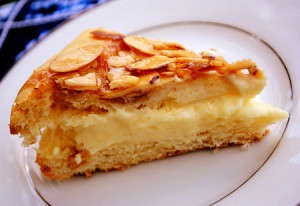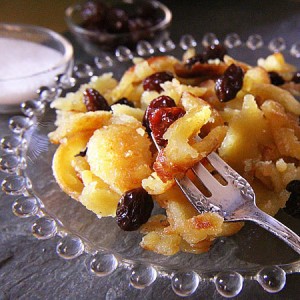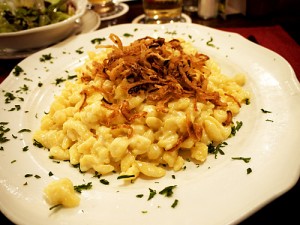September 12, 1683 Austrian, Polish and German troops successfully defend Vienna and defeat the attacking Turks. The Austrian commander in chief is Karl IV Leopold. September 12, 1739 Death of Reinhard Keiser in Hamburg, Germany. An early composer of operas, his style starts with Baroque and ends with Rococo. He studied music in Leipzig … [Read more...]
September 11 in German History
September 11, 1227 Death of St. Ludwig IV von Thüringen (1200-1227). Ludwig IV has never been formally canonized but has been regarded locally as a saint since shortly after his death. He led a pious life and was a good duke in Thuringia. He is remembered primarily due to the holiness of his wife, the very popular St. Elisabeth von Thüringen. … [Read more...]
Bienenstich – German Bee Sting Cake
Bienenstich or Bee sting cake is a German dessert made of sweet yeast dough with a baked-on topping of caramelized almonds and filled with a vanilla custard, Buttercream or cream. The cake may have earned its name from its honey topping: according to one legend, a bee was attracted to it, and the baker who invented the cake was … [Read more...]
Zwetschgenkuchen (German Plum Cake)
Zwetschgenkuchen is a traditional fresh plum cake, thought to have originated in the town of Augsburg, Germany. It is made with fresh prune plums which are at their peak in late summer. Perfect for the afternoon coffee hour. Serve at room temperature, with a dollop of fresh whipped cream. Ingredients: 1/2 cup butter, room temperature 1/2 cup … [Read more...]
The King’s Treat (Kaiserschmarrn)
The name of the dessert (Kaiserschmarrn, or Emperor’s mess) came from the Emperor's wife, Elisabeth, who was obsessed with maintaining her waistline, directed the royal chef to prepare only light desserts. Upon being presented with the chef’s confection, she found it too rich and refused to eat it. The exasperated emperor quipped, “Now let ME see … [Read more...]
Apple Strudel (Apfelstrudel)
This magically delicious Apple strudel is a classic German dessert. The German word Strudel literally means "whirlpool," and it refers to the technique and effect of rolling up of a generous fruit filling in phyllo dough. As a result you'll get a juicy apple and raisin filling encased in crisp flaky pastry. Ingredients: Crumb mixture: 3 … [Read more...]
Sauerkraut Recipes
Sauerkraut is probably the most well known German food. Sauerkraut is finely sliced green cabbage that has been fermented by lactic acid bacteria. The fermentation process (also known as pickling) gives the cabbage a distinct sour flavor, which is where it gets the name Sauerkraut (sour cabbage). In Germany, sauerkraut is often flavored with … [Read more...]
September 10 in German History
September 10, 1855 Birth of Robert Koldewey in Blankenburg am Harz, Germany. Koldewey was an archeologist who found the remains of the city of Babylon in southern Iraq. He began digging on March 26, 1899, and continued to work there with little interruption for the next 18 years. One of Koldewey’s most dramatic discoveries was the foundation of … [Read more...]
September 9 in German History
September 9, 1770 Death of Siegfried Bernard Albinus in Leiden, Netherlands (born in Frankfurt an der Oder, Germany). An anatomist, Albinus was the first to understand the relationship of the circulatory systems of a mother and unborn child. Albinus became a professor of anatomy at the University of Leiden in the Netherlands. September … [Read more...]
September 8 in German History
September 8, 801 St. Ansgar was born on September 8, 801 in Corbie (in modern France). In 823 he became a teacher in the newly founded monastery in Corvey in Westphalia (modern Germany). In 829 he founded the first Christian church in Sweden. He returned to Germany in 831 and became the first bishop of Hamburg. He continued his work of … [Read more...]
- « Previous Page
- 1
- …
- 57
- 58
- 59
- 60
- 61
- …
- 118
- Next Page »









